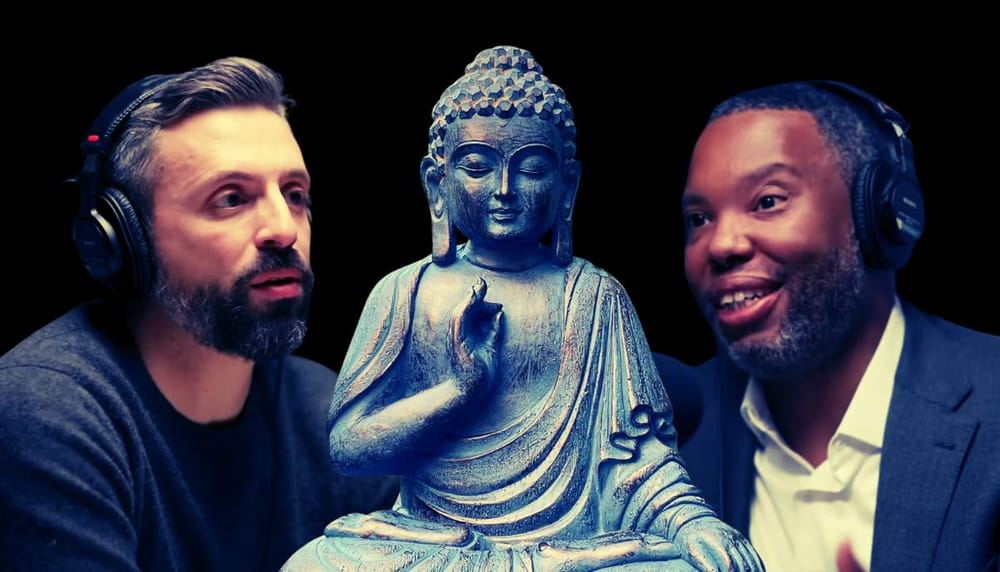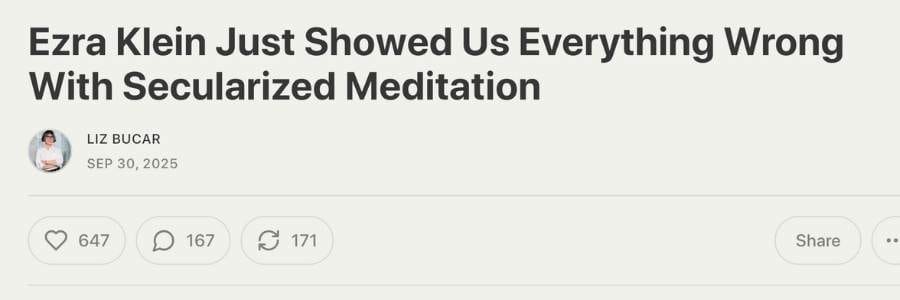
Liz Bucar, Rebecca Solnit and Matthew Remski go off the spiritual deep end after Ezra Klein cited a Buddhist passage in his conversation with Ta-Nehisi Coates. They also fundamentally misunderstand Buddhism.
Be Scofield is a prominent cult reporter who exposed Love Has Won, which led to the hit HBO series. She is the author of Hunting Lucifer: One Reporter's Search for Cults and Demons. Her work is cited by the NY Times, Rolling Stone, People, and more. It was also turned into an episode of "Unwell" on Netflix.
10/10/25
By BE SCOFIELD
An article is going viral claiming that “real” Buddhism is a left-wing revolutionary project. Liz Bucar—amplified by figures like Rebecca Solnit and citing Conspirituality’s Matthew Remski—blames “depoliticized” mindfulness for liberals who stay calm, detached, and complacent in the face of creeping fascism. She argues that mindfulness, stripped of “authentic” Buddhist teachings on generosity (dāna) and ethics (sīla), severs people from "collective struggle" and the work of "addressing systemic oppression."
However, Buddhism and meditation have never been political programs; they are trainings of the mind. From the earliest texts, the aim is personal awakening—freedom from suffering—not collective political liberation. Even the bodhisattva ideal seeks soteriological release from samsāra, not the seizure of power or the remaking of institutions.
The so-called missing pieces Bucar laments—right speech, right action, right livelihood—are personal guardrails, not organizing blueprints. And dāna, in practice, functioned as a personal virtue and a support system for a renunciant path: feeding monks, funding robes, huts, and medicine, hosting meals, and—at scale—endowing monasteries.

The Buddha could have built a political movement—organized, protested, shamed the complacent, and fought “the system.” Instead, he founded a renunciant monastic order aimed at personal liberation. The Vinaya he established kept monks out of worldly business—no money, no office, no campaigning—while the community focused on training the mind and teaching personal ethics. When anything “political” occurred, it was because rulers chose to seek moral counsel, not because the Saṅgha mobilized society; at most, a king might be advised to feed the poor and avoid violence.
When Rebecca Solnit shared Bucar’s piece, she invoked the bodhisattva vow: “Beings are numberless; I vow to liberate them.” She said Buddhism means "working for all beings," not retreating into a "private nirvana." But “liberation” here means freeing beings from personal traits like ignorance, greed, and hatred so they can escape the round of samsāra—not organizing their emancipation from particular state injustices. Moreover, the bodhisattva vow emerged over 400 years after the Buddha's existence.
Engaged Buddhism is a modern application, not the classical baseline. The inward turn that Remski and Bucar so despise is true to Buddhist tradition—not some depoliticized or secular distortion. Most Buddhists throughout the world—whether monks in Asia or insight teachers—are not engaged in social activism.
The founding story of the tradition underlines this. Siddhartha left palace life—abandoning his wife and newborn son—to seek awakening. After six years of wandering and intense practice, he woke up. He didn’t form a party or draft a platform; he sat under a tree and realized a path of inner transformation, or "private nirvana." Buddhism’s power has always begun there.
Ezra Klein's "Dangerous" Buddhism
Bucar builds her case on an Ezra Klein–Ta-Nehisi Coates conversation, claiming Klein’s “timid” politics are “directly connected” to "meditation divorced from ethical framework." She then asserts that “historically, Buddhism wasn’t divorced from political action,” pointing to modern episodes like self-immolations in the Vietnam War or Tibetan resistance. But Buddhism has equally been used to institutionalize patriarchy, and most notoriously by Japanese Zen Buddhists supporting fascist atrocities during World War II. Communities deploy the tradition toward their own ends.
Klein mentions he’s meditated for 15 years and quotes a Buddhist passage. Bucar (with an assist from Remski) reads this as spiritual whitewash and blames his “depoliticized” mindfulness.
The error is causality. Secular mindfulness doesn’t manufacture complacency—the practice doesn't carry that type of magical power. Most American meditators weren’t radicals before they sat; their calm or moderation reflects pre-existing temperament, networks, and incentives.
If committed radicals routinely adopted secular mindfulness and then drifted into quietism, Bucar and Remski would have a case. We don’t see that. We see selection effects: practice tends to mirror the container—activist communities use mindfulness to sustain organizing; conflict-averse liberals use it to manage stress; authoritarian movements can instrumentalize it for focus and endurance. Mindfulness is an instrument, not an ideology, and weak in terms of impacting one's political or social views.
If committed radicals routinely adopted secular mindfulness and then drifted into quietism, Bucar and Remski would have a case. We don’t see that.
Bucar and Remski’s real quarrel isn’t with “secular mindfulness”; it’s with liberal coalition politics of the Ezra-Klein variety. They treat caution and incrementalism as moral failure and then backfill a spiritual diagnosis. But awkwardness beside Coates’s vivid rhetoric isn’t sedation-by-meditation; it’s the familiar divide between expressive radicalism and vote-seeking liberalism.
McMindfulness
Mindfulness is one tool people use to cope with the stressors of living in a capitalist society. None of these tools—yoga, therapy, art, music, meditation, or other wellness practices—addresses the root cause of societal stress. They are not designed to.
Remski and Bucar allege mindfulness has been "captured" by corporate America. "Bosses might love it when you meditate and self-regulate and monitor your own thoughts," Remski says, remarkably. "They might love the fact that yoga means union, and you might forget about unions." Bucar echoes him: mindfulness is “attractive to HR departments” that want calm workers.
Once again, the two put the cart before the horse. A worker who is inclined toward labor activism will not "forget about unions" if they learn that the word "yoga" means "union." The suggestion is laughable. They infuse a sinister mythical power into sitting peacefully for ten minutes or doing asana during a shift break.
Bucar pushes this further, faulting inner-city mindfulness/yoga programs in schools for teaching self-regulation instead of “changing the systems that create the stress.” She goes on to claim "secularized" mindfulness is preventing revolution in impoverished schools—a clearly bizarre idea.
"It reinforces existing power structures by teaching oppressed communities to manage their reactions to oppression while letting privileged people off the hook for addressing the systems creating that oppression," Bucar writes.
By that logic we’d also indict art classes, school counseling, trauma-informed care, sports, after-school mentoring, and church youth groups—none of which dismantle structural causes, yet all measurably help kids cope. Consider Art Start in New York, which uses art to “reduce stress and accelerate psychological healing” for young people facing homelessness or the juvenile justice system.
Why do practices of self-regulation, whether art, yoga, or mindfulness, have to address the systems that create oppression? Only in an appropriated and historically inaccurate telling of Buddhism and yoga could one imagine their true purpose is to inspire left-wing political revolution.
By that logic we’d also indict art classes
Rebecca Solnit says what Ezra Klein was advocating "is not Buddhism as its founder and teachers intended it to be." Yet, his inward retreat is exactly what the Buddha has envisioned. "Peace comes from within, so do not seek it without," the Buddha said.
Religious ethics should not be confused with social justice education. Vague notions of compassion or generosity or warnings against "greed" are not the same as leftist civic engagement. Without specific political training, one will use Buddhist ethics to amplify their ignorance—and then falsely believe they've "figured it out" because they understand Buddhism "in context."
What these two thinkers, and Rebecca Solnit, really want is more leftist civic engagement. Trying to tweak mindfulness training for white liberals in America with generic notions of ethics is a terrible strategy to effect political change.
At the end of the day, Remski and Bucar are discussing an imaginary problem. This type of stuff is cooked up in a quasi-academic spiritual thought bubble detached from reality. If you've come to the point where you think "secularized" mindfulness is enabling fascism, you've overanalyzed in your armchair to the point of obscurity.

